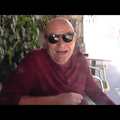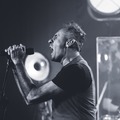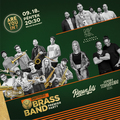Megújult a Lángoló!
Olvasd cikkeinket az új oldalunkon, ahol az eddigieknél jóval több tartalom vár!
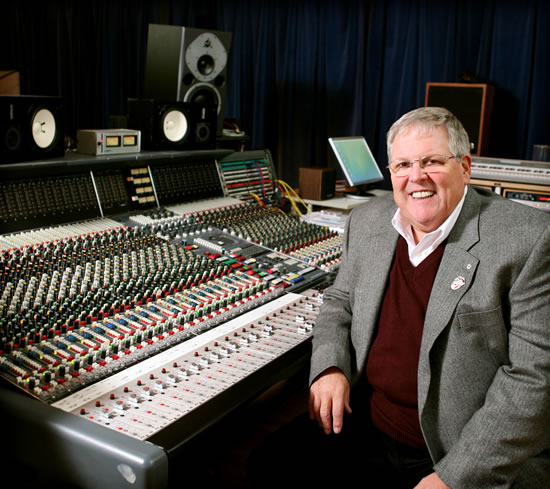 When most people think of John Lennon they think of The Beatles or Imagine or Yoko Ono - I think of Donald K. Tarlton. Donald K. Tarlton, professionally known as Donald K. Donald, has been a concert promoter and record label executive for over 40 years, working with giants like The Jimi Hendrix Experience (the first show he promoted), The Rolling Stones, Celine Dion, Rod Stewart, Pink Floyd, Kiss, U2 and, of course, John Lennon. He even works with our band as head of our Canadian label, Aquarius Records. He has helped shape, not only Canadian music, but the entire music industry as a whole. For example, the idea of backstage catering, food provided for a touring artist, and taken for granted by every self-entitled band, is owed largely to Donald when he mistakenly left his lunch in Johnny Cash's dressing room at the Montreal Forum in 1968.
When most people think of John Lennon they think of The Beatles or Imagine or Yoko Ono - I think of Donald K. Tarlton. Donald K. Tarlton, professionally known as Donald K. Donald, has been a concert promoter and record label executive for over 40 years, working with giants like The Jimi Hendrix Experience (the first show he promoted), The Rolling Stones, Celine Dion, Rod Stewart, Pink Floyd, Kiss, U2 and, of course, John Lennon. He even works with our band as head of our Canadian label, Aquarius Records. He has helped shape, not only Canadian music, but the entire music industry as a whole. For example, the idea of backstage catering, food provided for a touring artist, and taken for granted by every self-entitled band, is owed largely to Donald when he mistakenly left his lunch in Johnny Cash's dressing room at the Montreal Forum in 1968.
"I had brought my lunch and made it down to the dressing room, I went and did a couple of errands and Johnny Cash came in for rehearsal, saw the sandwiches there and helped himself. Saul Holiff (Cash's manager) told me what a brilliant move that was bringing sandwiches and having food for the artist available in the dressing room and that was the first time there was catering," says Tarlton. After hearing that story, I now say a little thank you to Donald under my breath every time I see a nice catering spread laid out for us during lengthy and exhausting tours.
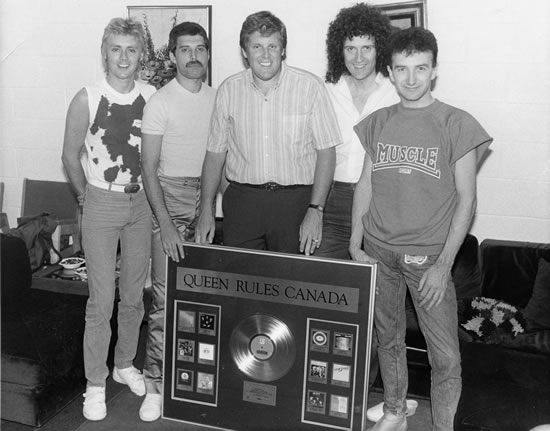
With 2010 being the year that John Lennon would've turned 70 years old, all eyes are on the most fab of the four yet again. I tracked Donald down to reminisce over Beatle John, as he figures significantly in the Lennon legacy - the infamous 1969 Montreal Bed-In where John Lennon wrote and recorded Give Peace A Chance and the night after the Plastic Ono Band's Toronto debut at the Montreal Forum where Donald read out Lennon's world message, kick-starting a tradition that is upheld at rock concerts to this day.
In 1969, unable to gain entrance into the United States, John Lennon and Yoko Ono set up camp in room #1742 of The Queen Elizabeth Hotel in Montreal and staged a "Bed-In" for almost 7 days, charmingly holding a press conference and innocently asking for World Peace, on their bed, in their pajamas. It caught the eyes of the world and eventually the ears of the world when he wrote and recorded Give Peace A Chance during his stay. Tarlton was not only present for the song’s germination but was there when it was finally recorded.
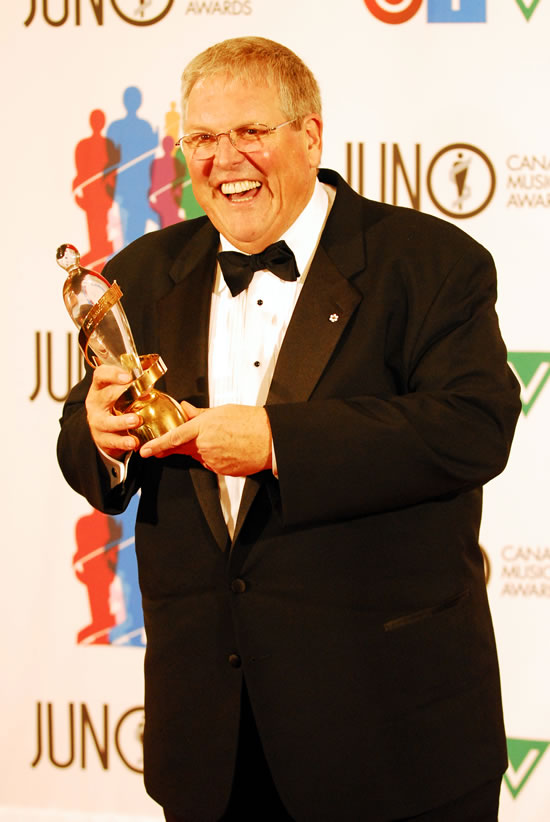
"There was a writer at the Montreal Gazette or Star and she called me and said that John Lennon was setting up shop in the Queen E. Hotel and we should go down and say hello. We went down, met John Lennon, and I had enough notoriety at the time to get into the room and sit there. And I was there when he came up with the idea for Give Peace A Chance. He was doing an interview with a Boston radio station and he kept saying, "All we're trying to do, man, is give peace a chance. All we are saying is give peace a chance." Then there was a whole bunch of people talking, and then he said, "Let's do a record." All of a sudden it was who knows this and who knows that and on and on. John was writing with a marking pen the lyrics to the song. I wasn't there the whole time, but it was a process that happened over a 24-hour period of time. And I got there just as the recording session was on and I played a little tambourine on Give Peace A Chance.
A few months later in Toronto, Lennon and Tarlton's paths crossed again at the Toronto Rock 'N' Roll Revival festival with Little Richard, Jerry Lee Lewis, The Doors, and the world debut for the Plastic Ono Band featuring Lennon, Ono and Eric Clapton. Tarlton was in the dressing room with Lennon and his manager, Alan Klein, when drama reared its head.
“The Toronto Musician's Guild representative came to the dressing room at Varsity Stadium and told everybody that John Lennon couldn't go on stage because he hadn't filed a union contract. So Alan Klein yelled out, "Is there a licensed union agent in the room?" and I put up my hand. I just happened to have a blank contract even though it said "Montreal Musician's Guild" in my briefcase and wrote out the contract for union scale for John Lennon to play for the first appearance of the Plastic Ono Band and it was for $129. God, I wish I had kept that contract. It was signed by John Lennon, signed by Alan Klein (and) signed by John Brauer, the promoter of the show. I don't know what ever happened to the contract. I should've kept a copy. It would've been some great paraphernalia Hard Rock Cafe souvenir.”
Afterwards, Donald decided to press his luck and ask the Plastic Ono Band to play the next night where he was promoting The Doors at The Montreal Forum:
“John said he'd love to do it but Alan Klein vetoed it right away. They had to leave first thing in the morning back for London but John Lennon took me by the arm (and) he said, “Donald there is something I'd like you to do. I'd like you to go to Montreal and just before the show starts, go on stage and ask everyone to Give Peace A Chance”
Boy, it was like a message from God! There I was, John Lennon giving me an assignment to change the world. I was so excited about it. I flew back to Montreal, hardly slept that night. I got my little speech done, typed it up in English and French was so excited, walked on stage and the lights were down, went to the microphone and I asked everyone if they would chant a message from John Lennon who was in Toronto the night before and he asked me to come and speak to the people of Montreal and asked them to all stand together and to chant Give Peace A Chance. Well the people started chanting Give Peace A Chance. I took a match from my pocket and I held it up in the air. Everyone lit a match and it was like a blaze of glory you've ever seen of fire in the building and it was awesome and it was eerie and it was exciting and so...the highest tribute people get at rock concerts is when the crowd stops and lights a match over their head when they see something that's really terrific or memorable that's happened. And that started for the first time so John Lennon was part of the very first Rock 'n' Roll tribute with the matches and lighter.”
I asked Donald for his personal impression of Lennon up-close. “John Lennon was a very gentle and spectacular person. He was one of those guys that said never give up. Just pick your message and bring it home and don't worry what they say about you. It's been 35 years, but you know what? Never has John Lennon's message been more important than it is today.”
Every generation has a certain someone that emerges as its figurehead and touches everyone, regardless of political ideology or social class. John Lennon became, albeit reluctantly, the torchbearer for his time. When he got assassinated, I was still too young to grasp the significance of the event, but strangely, I still remember exactly what I was doing when I heard the news, most people do. In a world where Lennon has been deceased for 30 years, his presence is still strongly felt but sadly his message has yet to get through.
I'm nothing what you'd call a "Beatle Geek". If life is about choosing sides, I chose The Rolling Stones ages ago, but I still love The Beatles. Listening to John Lennon's solo material like "(Just Like) Starting Over", "Watching The Wheels", and "Nobody Told Me" is like taking a trip back into my childhood. The songs are so unforgettable they couldn't help but mark my life as it happened. Rarely can a musician or band do that through casual listens. It's a testament to the musical genius of John Lennon. Still, Lennon's all pervasive presence can easily make any music fan take him for granted. As each successive generation emerges with their own music, their own heroes and their own voice, past idols fade into the background. However, just like every steadfast rule in the book, there are always exceptions and in this case that exception is John Lennon.

